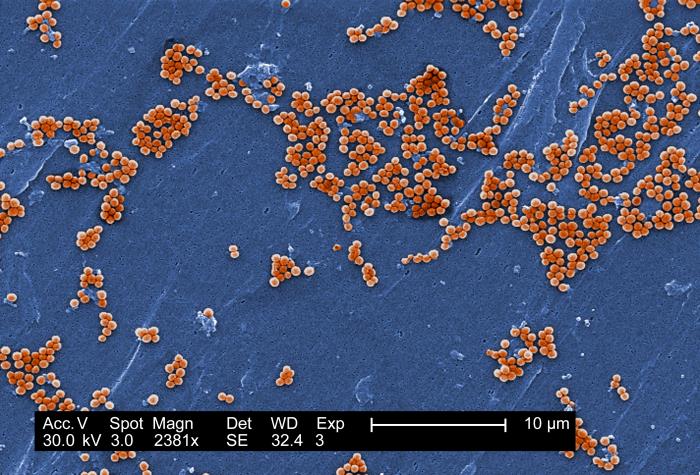 |
| Looks sort of pretty, right? But this scanning electron micrograph shows clumps of methicillin-resistant Staphylococcus aureus (MRSA) bacteria. Source: CDC |
If you're concerned about the meat you eat, today's New York Times carried a must-read blog posting by Mark Bittman. It can be found here.
Some choice parts:
"A study earlier this year by a nonprofit research center in Phoenix analyzed 80 brands of beef, pork, chicken and turkey from five cities and found that 47 percent contained staphylococcus aureus, a bacteria that can cause anything from minor skin infections to pneumonia and sepsis, more technically called systemic inflammatory response syndrome (SIRS), and commonly known as blood poisoning — but no matter what you call it, plenty scary. Of those bacteria, 52 percent were resistant to at least three classes of antibiotics."
What does this mean? Fasten your seat belts...
"So when you go to the supermarket to buy one of these brands of pre-ground meat products, there’s a roughly 25 percent chance you’ll consume a potentially fatal bacteria that doesn’t respond to commonly prescribed drugs."
Really? A one in four chance?
And it's all because of this:
"A staggering 80 percent of the antibiotics sold in the U.S. are given to farm animals, mostly, as I said, prophylactically: the low-dose drugs help the animals fatten quickly and presumably help ward off diseases caused by squalid living conditions. The animals become perfect breeding grounds for bacteria to gain resistance to the drugs, and our inadequate testing procedures allow them to make their way into stores and our guts."
Sadly, the FDA, which is the government agency tasked with overseeing this issue, doesn't seem to have much regulatory bite when it comes to creating and enforcing strict regulations on antibiotic use in livestock. Therefore, it is up to consumers to reduce their risks of ingesting potentially fatal bacterial. The choices are clear: don't eat meat, or if you do, buy organic. Employing intense food hygiene and appropriate cooking practices at home can help, too. You can read more about how to reduce your risk of getting bacteria from meats here.
Remember, people, the best defense is a good offense.
###
Cook that meat. Cook it well. Bacteria may become resistant to medications, but I haven't read anything about being able to resist 200 degrees of heat. Rare and Medium Rare ground beef consumers beware!
ReplyDeleteDave - you're right. That's one of the most important things you can do.
ReplyDeleteAnd don't stuff that turkey!
its all gravy from here, rare please.
ReplyDeletehave you seen the new study that determined sitting down all day makes your ass fat?
Clark,
ReplyDeleteOn the off chance that you are serious, I suppose you're referring to this study: http://www.cnn.com/2011/HEALTH/06/24/sitting.shorten.life/index.html